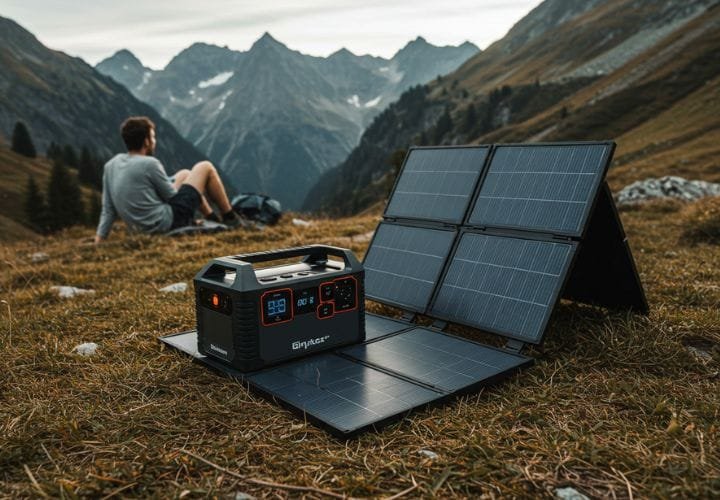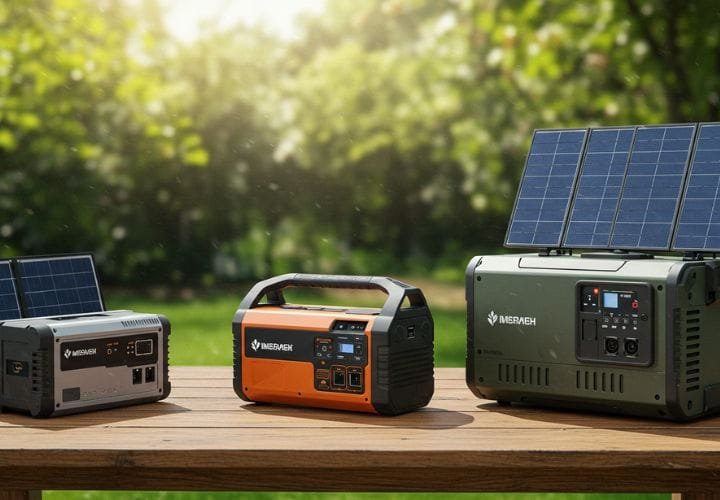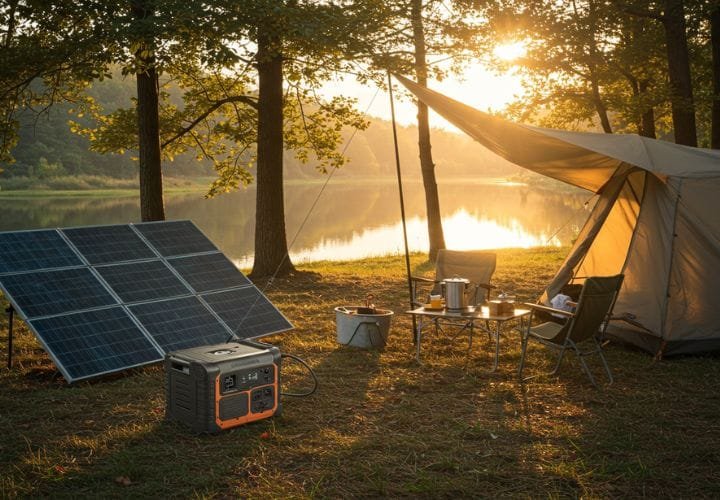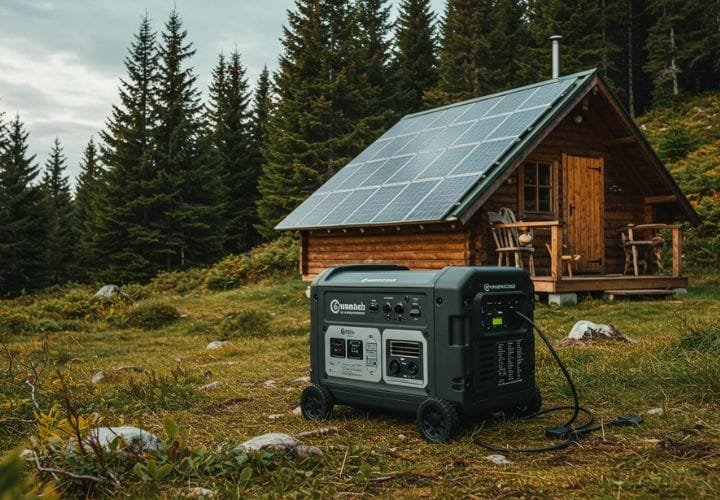Have you ever thought about being independent from the usual energy sources? With a growing interest in renewable energy, solar generators stand out as a top choice. They are perfect for remote cabins, RV travels, or if you want to cut down on grid dependence. So, why are these devices becoming essential for energy freedom today?
Going off-grid means less reliance on non-renewable energy and a cleaner, quieter energy source. Solar generators are light, easy to carry, and good for the environment. They use lithium-ion batteries for longer life and better efficiency than old-school batteries. Plus, you can charge them in different ways—AC, DC, or solar panel. This means you’ll always have power, wherever you go.
Solar generators are more than just a power source—they’re super versatile. They make almost no noise, perfect for quiet camping nights. And as energy costs go up, choosing a solar generator could save you money and help the planet. It’s a win-win investment.
Understanding Off-Grid Energy: An Introduction to Solar Generators
Switching to off-grid power solutions can be easy with the right equipment. Solar generators lead this change. They convert sunlight to electricity without using fossil fuels. This makes them a clean option with no pollution.
Solar generators have four key parts: solar panels, a charge controller, batteries, and an inverter. Each part is important for the system to work well:
- Solar PV Panels: These panels catch sunlight and turn it into energy. They can produce from 100W to 360W depending on their size.
- Charge Controller: It controls how energy moves from the panels to the batteries. It stops the batteries from overcharging. MPPT controllers are used in grid-tied systems, and PWM controllers are for off-grid or DIY projects.

- Storage Batteries: The energy from the panels is stored in these batteries. They come in types like lead-acid and lithium-ion. Lithium-ion batteries last over 2,000 charges, which is longer than lead-acid batteries.
- Solar Inverter: This changes DC electricity in the batteries to AC electricity. Using pure sine wave inverters is best for efficient power.
Solar generators are not just good for the environment. They can be used in many ways, from small portable ones to big systems for the whole house. After buying, solar generators get energy from the sun for free. This saves money compared to using gas generators.
Knowing about these off-grid power systems helps you choose wisely. They cost little to maintain, run quietly, and keep power on during outages. Solar generators are great for people who care about the earth or need a reliable backup power source.
| Component | Role | Common Specs |
|---|---|---|
| Solar Panels | Converts sunlight to electrical energy | 100W to 360W |
| Charge Controller | Manages energy flow to batteries | MPPT or PWM |
| Storage Batteries | Stores energy for later use | Lead-acid: ~500 cycles, Lithium-ion: 2000+ cycles |
| Solar Inverter | Converts DC to AC power | Pure sine wave recommended |
Benefits of Using a Solar Generator

Environmental Sustainability
Solar generators are great for the environment. They turn sunlight into electricity without making greenhouse gases. This makes them a top choice for eco-friendly energy. They help lower your carbon footprint a lot.
Since they get power from the sun, there’s no need for fuel-based generators. Those old generators cause pollution and use up resources. Solar ones don’t have these issues.
Cost-Effectiveness
Solar generators save you money over time. They don’t need you to keep buying fuel, thanks to the sun’s free energy. For example, a solar generator for camp is a smart one-time buy. It powers devices and small appliances without ongoing costs.
This can save you money for 25-35 years, the usual life of a solar generator. This makes them a smart investment.
Low Maintenance and Noise-Free Operation
Solar generators are easy to take care of. They don’t have many moving parts, so they barely need any maintenance. This lets you relax more and fuss less over gear. They’re also very quiet, which is perfect for peaceful living off-grid or on camping trips.
This quiet operation makes them ideal for a solar generator for camp. You get to enjoy a quiet and peaceful setting.
| Feature | Solar Generators | Traditional Generators |
|---|---|---|
| Environmental Impact | Low (Clean Energy) | High (Emits Greenhouse Gases) |
| Cost-Effectiveness | High (Free Solar Energy) | Low (Continuous Fuel Costs) |
| Maintenance | Low (Fewer Moving Parts) | High (Frequent Maintenance Required) |
| Noise Level | Quiet | High Noise |
Choosing solar generators means more reliable power and big wins for both the environment and your wallet. They’re perfect for a quiet getaway, a fun camping trip, or cutting down on carbon emissions at home. Solar generators are a smart pick for many reasons.
Choosing the Right Solar Generator: Factors to Consider

Power Output Capacity
Solar generators have a power range between 1800W and 2400W. Their surge capacity can hit 2400W. This lets them handle many devices, from phones to camping gear. They’re great for powering almost all camping appliances at once.
Battery Capacity
Battery size is crucial to consider. The market offers generators with 1056Wh to 2048Wh. This is enough to keep your gadgets charged overnight or on cloudy days. Also, many use LiFePO4 batteries for about 3,000 charge cycles, which means they last long.
Portability
Easy transport is essential for travelers and campers. Portable solar generators have handles, wheels, and foldable panels. This makes them simple to move and use anywhere outdoors. Their design makes them perfect for adventures away from the grid.
Solar Panels and Charging Efficiency
How fast and efficiently solar panels charge is crucial. Most solar generators include 200W panels that can recharge quickly, in just 1.8 hours. They often have smart monitoring through apps. This allows you to keep an eye on energy use and make adjustments for better efficiency. Placing your panels right will get you the most power.
| Feature | Specification | Benefit |
|---|---|---|
| Power Output | 1800W-2400W | Supports various devices |
| Battery Capacity | 1056Wh-2048Wh | Long-lasting power |
| Portability | Handles, wheels, foldable panels | Easy transport |
| Solar Panel Efficiency | 200W, 1.8-hour recharge | Quick charging |
| Durability | Impact-resistant, flame-retardant | Reliable outdoor use |
Solar generator for camping

“Solar generator packages cater to diverse needs, offering a combination of portable solar panels, energy banks, and appliances like portable fridge freezers. These solutions provide versatile and efficient energy options for various lifestyles.”
Buying a solar generator means not worrying about ongoing fuel costs or extensive maintenance. This is due to their minimal moving parts. Advances in solar panel technology continue to improve efficiency, allowing for better energy capture from sunlight. Always place your solar panels in sunny spots to maximize performance.
Tips for Maximizing Your Solar Generator’s Efficiency

Proper Installation
Setting up your solar generator right is the first step. Make sure your solar panels get a lot of sun all day. They should face true south if you’re in the Northern Hemisphere. This way, your solar generator gets the best sunlight, working at its peak.
Regular Maintenance
Keeping your solar generator in good shape is important. Clean off any dust or leaves from your panels regularly. Also, check that the battery connections and inverter are secure and work well. Keeping an eye on the charge controller helps avoid any problems.
Energy-Saving Practices
Using less energy makes your solar generator even better. Choose LED lights and appliances that don’t use much power. Turn things off when you’re not using them and use power strips for multiple devices. These steps help you get the most from your solar generator by saving energy.
Conclusion
Solar generators are becoming key for energy independence. They offer a reliable and green choice for off-grid power. By using solar generators, your home, outdoor activities, or emergencies are powered sustainably. This not only reduces environmental impact but also saves money with low upkeep.
The range of solar generators today meets various needs and budgets. For example, the EcoFlow River 2 can power a TV for 2 to 4 hours with its 256Wh capacity. The DELTA Pro, on the other hand, comes with 3600Wh. It can go up to 25K Wh for bigger power needs. These options show durability, offering up to 3000 cycles at more than 80% capacity.
Solar generators need less upkeep than gas ones and are quiet. They also don’t release harmful emissions. Choosing the right model and maintaining it can boost your solar power benefits significantly. Investment in a solar generator supports your energy needs and helps the planet too.
FAQ
What is a solar generator?
A solar generator turns sunlight into electrical energy using photovoltaic panels. The energy is stored in batteries and used when needed. It’s perfect for places without regular power sources.
What are the benefits of using a solar generator for off-grid energy?
Solar generators are great for the environment and your wallet. They’re quiet, have low upkeep, and don’t emit harmful gases.
Since they run on sunlight, there’s no need to buy fuel. This cuts down on costs.
How do I choose the right solar generator for my needs?
When choosing a solar generator, look at power and battery capacity, and how portable it is. You want one that matches your energy needs, is easy to carry, and works well even when it’s not very sunny.
Can solar generators be used for camping?
Yes, they’re awesome for camping. They’re portable, pollution-free, and can power up your gear. They make camping more enjoyable by providing clean energy.
How can I maximize the efficiency of my solar generator?
To get the most from your solar generator, place panels where they’ll get lots of sun. Keeping panels clean and batteries in good condition is essential.
Also, use energy-saving appliances to lower how much power you need. This helps your generator last longer.
What makes solar generators a sustainable energy source?
Solar generators don’t pollute because they make energy from sunlight. They use a sustainable energy source and need less maintenance. This makes them last longer.
Are solar generators cost-effective?
Yes, they save you money over time. Solar generators don’t need fuel, which means fewer energy costs. The money saved can cover the initial cost of the generator.
Why is portability important in a solar generator?
Portability matters for people who move around a lot, like campers or RV owners. A portable generator makes it easy to have power wherever you go. It’s a convenient solution for power needs on the move.



[…] are addressing long-standing challenges in the industry and opening up new possibilities for clean energy […]
[…] combination of solar power and AWG technology provides substantial benefits that make these systems both innovative and […]